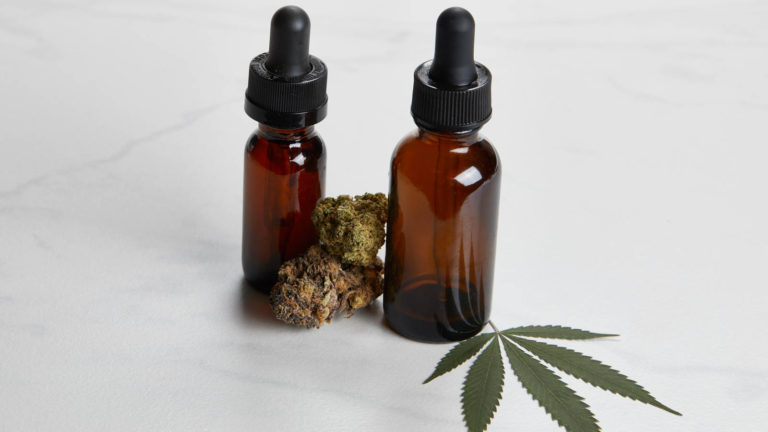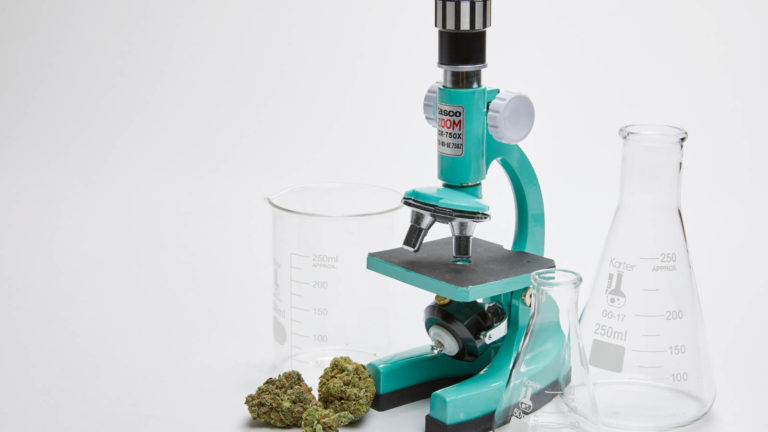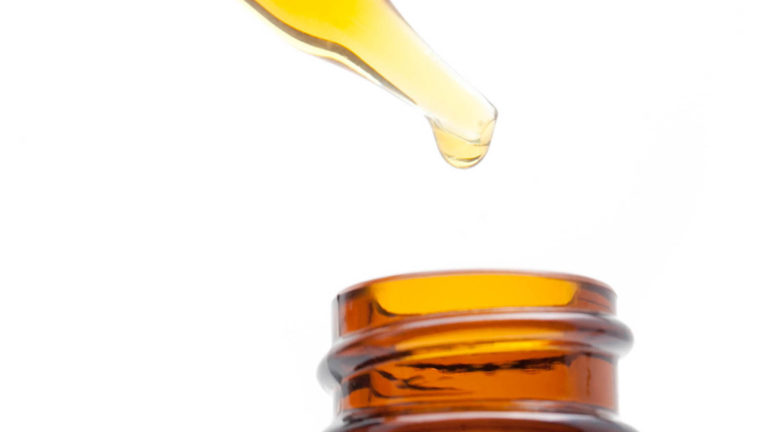Migraines can be profoundly debilitating, with migraine sufferers often experiencing additional troubling symptoms such as nausea and light sensitivity. An estimated 15% of individuals globally suffer from migraines. In the U.S., head pain is the fifth-leading cause of emergency room visits.
Current research indicates that migraines occur when the threshold for pain signaling drops in response to inflammatory agents. Environmental and hormonal triggers most likely initiate the onset of a migraine. Migraine medication often provokes adverse effects, which has resulted in a reduction of research into migraine drugs.
 Photo by: Gina Coleman/Weedmaps
Photo by: Gina Coleman/WeedmapsImage lightbox

Given this context, many migraine sufferers are receptive to new treatments that promise to help manage migraine pain. Cannabidiol (CBD) oil has recently captured the attention of scientists and patients alike. CBD's analgesic effects, anti-inflammatory properties, and anti-nausea qualities may help relieve the symptoms associated with the condition.
Research overview
While there are still no clinical studies exploring the efficacy of CBD oil as a treatment for migraines, several scholarly reviews and studies point to the importance of modulating the endocannabinoid system (ECS) and the use of cannabinoids such as CBD as a potential therapy.
Endocannabinoid receptors are found in the pain processing areas of the brain. “Anandamide (an endocannabinoid) has been shown to target some of the same signaling pathways as triptans, a class of medications primarily used in the treatment of migraines and cluster headaches. This supports the therapeutic potential of cannabinoids in the treatment of migraine,” explained Rosalia Yoon, a cannabis research scientist for Toronto-based Apollo Cannabis Clinics, which advises patients and conducts studies on medical marijuana.
CBD has been shown to reduce inflammation and pain in animal models by targeting specific receptors within the endocannabinoid system.
The studies
A 2019 review published in “Current Opinion in Neurology” suggests that CBD may have a role to play in alleviating the pain associated with migraines. CBD can affect the function and activity of signaling pathways by targeting the receptors that play a role in pain control.
The review also points out that CBD can suppress the release of certain proteins, which are linked to inflammatory pain and modulate the immune cell system. The modulation of the ECS with cannabinoids could offer a tolerable and pharmacologically sound treatment for migraines; however, the study's authors expressed the need for further studies to explore the mechanisms by which this occurs.
 Photo by: Gina Coleman/Weedmaps
Photo by: Gina Coleman/WeedmapsImage lightbox

There is clinical evidence that suggests this hypothesis could hold validity. A 2007 study published in the journal “Neuropsychopharmacology” showed evidence of depressed anandamide levels in the cerebrospinal fluid of migraine sufferers. Low anandamide levels are a possible indication of an impaired ECS. These findings point to cannabinoids as a potential therapy for chronic migraine sufferers.
According to Dr. Ethan Russo, author of the study in “Cannabis and Cannabinoid Research,” randomized, controlled trials utilizing standardized preparations with low THC and high CBD are long overdue. There is already preclinical evidence that THC can ameliorate migraine pain, according to the “European Journal of Pharmacology.”
Patient perspectives
Shelly Schneider, 39, is the president of a busy CBD e-commerce store and a mother. She first began to experience migraines while she was in college in 2003, which she attributes to ongoing stress and tension.
“When I get a migraine, it takes me out for the day. I need a heat pad and a dark, quiet room. Then I need to sleep it off. It makes me nauseated and makes my entire head throb,” she said.
Schneider had traditionally relied on Tylenol to help manage her migraines. She began taking CBD oil for cholesterol but realized it was also alleviating her migraines. “When I realized it was also helping with my migraines, I was sold,” she told Weedmaps News.
 Photo by: Gina Coleman/Weedmaps
Photo by: Gina Coleman/WeedmapsImage lightbox

Schneider said CBD oil also helps with migraine prevention. “Since CBD has anti-inflammatory properties, it helps with the tension and prevents the migraines from getting as bad if I do get one. They are also much less frequent.”
Schneider notes that her anxiety has diminished, and endometriosis pain is improved, benefits she also attributes to CBD oil.
What the experts say
Dr. Stephen Silberstein, Director of the Jefferson Headache Center in Philadelphia, recommends CBD oil for his migraine patients. Among its benefits, Silberstein points out that it is non-intoxicating, non-sedating, reduces anxiety, and doesn't reinforce cravings or compulsive use.
“We use CBD topically in the area of the neck with good results. We're uncertain as to the benefit of CBD taken orally for migraines, however.” This may be because CBD ingested orally has limited bioavailability.
Dr. Steven Zodkoy, a medical consultant at Monmouth Advanced Medicine, a New Jersey chiropractic clinic, noted that his chronic migraine patients use CBD in a preventative capacity. Zodkoy said that CBD helps to mediate their overall stress level, which is helpful as migraine patients often become fearful of triggering an episode. “Physiologically, CBD has a relaxing effect on the body, which makes it more pliable to adjust to stress. I have been using full-spectrum hemp products/CBD with my migraine patients for a few years with excellent results.”
 Photo by: Gina Coleman/Weedmaps
Photo by: Gina Coleman/WeedmapsImage lightbox

Bottom line
Anecdotal evidence suggests that CBD may be a potential first-line or adjunct treatment for migraines. But randomized, controlled trials are needed to determine CBD's efficacies, and to develop dosage recommendations.
Major contributions from Dr. Adie Rae.

